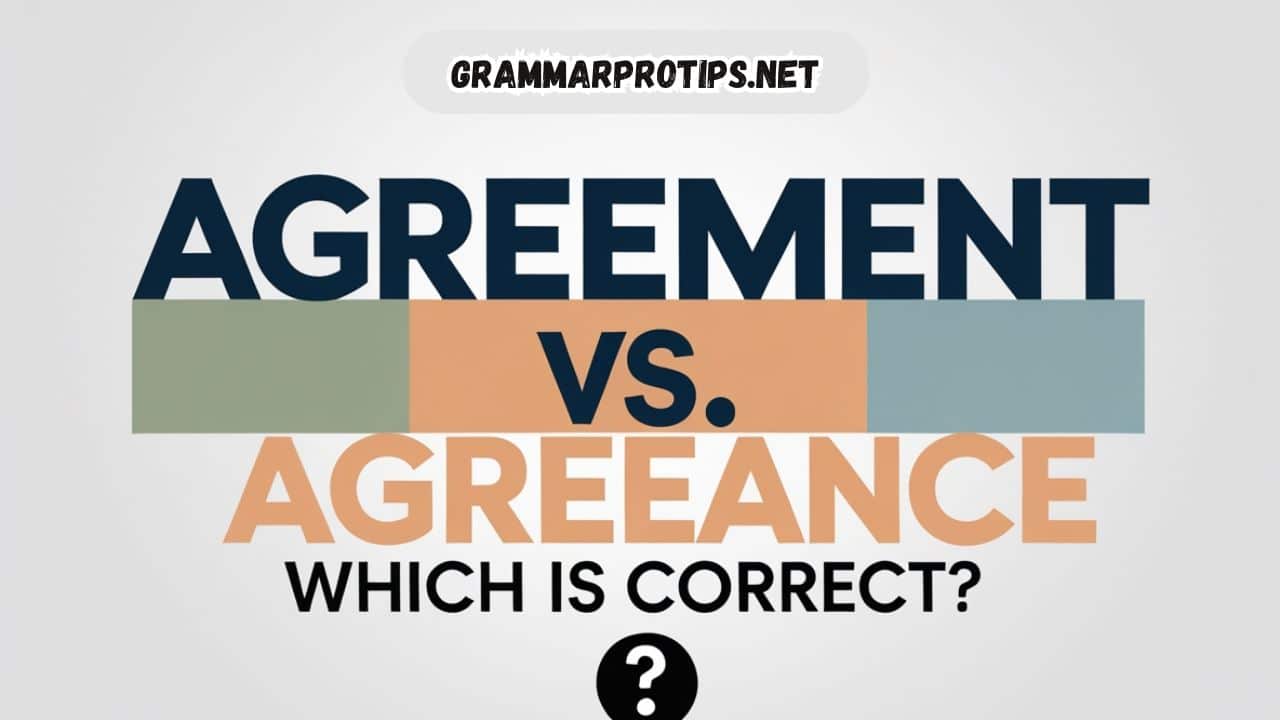If you’ve ever wondered whether to use “agreement” or “agreeance”, you’re not alone. These two words often get mixed up, and many people question which one is correct.
In this article, we’ll explore the meaning, usage, and history of these two terms, and give you practical examples to ensure you’re always using the right one.
What Is the Difference Between “Agreement” and “Agreeance”?
At first glance, it may seem like “agreeance” is just a variation of “agreement,” but there are important differences to note. Let’s break them down.
Agreement: The Correct and Common Word
“Agreement” is the proper and widely accepted term in English. It refers to a mutual understanding or consent between two or more parties. You might see it used in legal documents, casual conversations, or business settings.
For example:
- “We reached an agreement on the terms of the contract.”
- “The team is in agreement about the new strategy.”
Agreeance: Is It a Real Word?
On the other hand, “agreeance” is not a word you’ll typically find in most formal writing or dictionaries. While it appears in casual speech from time to time, it’s considered incorrect by most language experts.
So, is agreeance a proper word? In short, no. Though some people use “agreeance” as a substitute for “agreement,” it’s not accepted in standard English.
Many grammar resources, including the Oxford Dictionary, will not recognize “agreeance” as a valid word, and it does not appear in their listings.
For example, a search of “is agreeance in the Oxford Dictionary” will reveal that it’s simply not included.
The Historical Context of “Agreeance”
The confusion between “agreement” and “agreeance” likely stems from historical usage. The word “agreeance” has etymological roots in Middle English, but over time, the modern English language evolved, and the more standard term “agreement” became the dominant form.
Agreeance Etymology
The word “agreeance” originated from the Latin root “agreementum,” which means “to bring into harmony.”
However, over centuries, the word “agreement” replaced “agreeance” in both formal and colloquial contexts.
Modern English now recognizes “agreement” as the standard form, and “agreeance” is often viewed as archaic or incorrect.
Is “Agreeance” Synonym to “Agreement”?
Though “agreeance” might seem like a synonym of “agreement,” it is not a proper synonym in contemporary English. While both words refer to mutual understanding or consent, “agreeance” is generally considered a misstep or informal version of the more formal “agreement.”
If you are seeking a synonym for “agreement,” you might consider words like:
- Understanding
- Consent
- Accord
- Contract
- Deal
For example, in a legal email or contract, you’d want to avoid using “agreeance.” Instead, you’d use the word “agreement” to ensure clarity and formality.
Correct Usage: “Agreement” vs “Agreeance in a Sentence”
Let’s explore how these two words might be used in actual sentences, especially in everyday situations like emails or workplace communication.
Using “Agreement” Correctly
In a business context, it’s crucial to use “agreement” when discussing shared terms, contracts, or understandings. Here’s an example of how you might write an email:
Subject: Agreement on New Marketing Strategy
Dear Sarah,
I hope you’re doing well! I wanted to confirm our agreement on the new marketing strategy for the upcoming quarter. We’ve agreed on the key goals and the timeline, and we’re ready to move forward.
Please let me know if you have any further questions or suggestions.
Best regards,
Tom
In this email, “agreement” is used to describe the mutual understanding between Tom and Sarah about the marketing plan. It’s clear, formal, and correct.
Incorrect Use of “Agreeance”
Now, let’s look at an example of an incorrect sentence where someone might mistakenly use “agreeance.”
Subject: In Agreeance on New Marketing Strategy
Dear Sarah,
I hope you’re doing well! I wanted to confirm that we are in agreeance on the new marketing strategy for the upcoming quarter. We’ve agreed on the key goals and the timeline, and we’re ready to move forward.
Please let me know if you have any further questions or suggestions.
Best regards,
Tom
In this case, the word “agreeance” is used incorrectly. The correct term should be “agreement.” The email sounds awkward and unprofessional when “agreeance” is used, and it can confuse the recipient.
How to Choose: “In Agreeance” vs. “In Agreement”
A common error that people make is using the phrase “in agreeance” instead of the correct “in agreement.“
“In agreement” is the proper expression to indicate that two or more parties share the same opinion or understanding.
Example:
- “I am in agreement with the proposal.”
In contrast, “in agreeance” sounds awkward and incorrect, even though some people use it in casual conversation. To keep things professional and clear, always opt for “in agreement.”
What Does the Webster Dictionary Say About “Agreeance”?
To clear up any confusion, let’s take a quick look at agreeance in the Webster Dictionary. If you search for “agreeance definition Webster,” you’ll find that Webster does not include it as a standard word. Instead, it lists “agreement” as the correct term.
Webster’s definition of agreement includes:
- The act of coming to a shared understanding.
- A negotiated or formal arrangement.
- The state of being consistent or harmonious with someone or something.
This emphasizes the importance of using “agreement” when referring to a mutual understanding, contract, or consensus.
The Bottom Line: Agreement vs. Agreeance – Which is Correct?
The bottom line is clear: “agreement” is the correct term to use. Whether you’re crafting a formal email, writing a contract, or simply expressing a shared understanding, “agreement” is always the preferred word.
“Agreeance” may occasionally appear in informal speech, but it is generally considered incorrect and should be avoided in professional writing.
To Summarize:
| Aspect | Agreement | Agreeance |
|---|---|---|
| Correctness | Correct and widely accepted. | Not a word in modern English. |
| Meaning | Mutual understanding or consent. | Same as agreement but informal and incorrect. |
| Common Usage | Legal, business, formal settings. | Rare and considered incorrect. |
| Synonyms | Understanding, consent, accord, deal. | Not recognized as a synonym. |
| Example | “The team reached an agreement.” | “The team was in agreeance” (incorrect). |
By sticking with “agreement,” you’ll keep your writing clear, professional, and grammatically correct. So, the next time you’re faced with this choice, you’ll know exactly which one to pick! [Agreement vs. Agreeance – Which Is Correct?]
Read more knowledgeable blogs on Grammar Pro Tips

Sienna Mauldon is a passionate writer and grammar expert. On her blog, she shares easy-to-follow guides to help readers master grammar rules and improve their writing. With a love for language and teaching, Sienna makes grammar simple and fun for everyone, from beginners to experienced writers.








